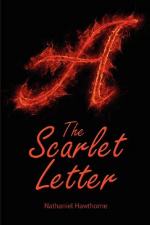There was a singular circumstance that characterised Mr. Dimmesdale’s psychological state at this moment. All the time that he gazed upward to the zenith, he was, nevertheless, perfectly aware that little Pearl was pointing her finger towards old Roger Chillingworth, who stood at no great distance from the scaffold. The minister appeared to see him, with the same glance that discerned the miraculous letter. To his feature as to all other objects, the meteoric light imparted a new expression; or it might well be that the physician was not careful then, as at all other times, to hide the malevolence with which he looked upon his victim. Certainly, if the meteor kindled up the sky, and disclosed the earth, with an awfulness that admonished Hester Prynne and the clergyman of the day of judgment, then might Roger Chillingworth have passed with them for the arch-fiend, standing there with a smile and scowl, to claim his own. So vivid was the expression, or so intense the minister’s perception of it, that it seemed still to remain painted on the darkness after the meteor had vanished, with an effect as if the street and all things else were at once annihilated.
“Who is that man, Hester?” gasped Mr. Dimmesdale, overcome with terror. “I shiver at him! Dost thou know the man? I hate him, Hester!”
She remembered her oath, and was silent.
“I tell thee, my soul shivers at him!” muttered the minister again. “Who is he? Who is he? Canst thou do nothing for me? I have a nameless horror of the man!”
“Minister,” said little Pearl, “I can tell thee who he is!”
“Quickly, then, child!” said the minister, bending his ear close to her lips. “Quickly, and as low as thou canst whisper.”
Pearl mumbled something into his ear that sounded, indeed, like human language, but was only such gibberish as children may be heard amusing themselves with by the hour together. At all events, if it involved any secret information in regard to old Roger Chillingworth, it was in a tongue unknown to the erudite clergyman, and did but increase the bewilderment of his mind. The elvish child then laughed aloud.
“Dost thou mock me now?” said the minister.
“Thou wast not bold!—thou wast not true!” answered the child. “Thou wouldst not promise to take my hand, and mother’s hand, to-morrow noon-tide!”
“Worthy sir,” answered the physician, who had now advanced to the foot of the platform—“pious Master Dimmesdale! can this be you? Well, well, indeed! We men of study, whose heads are in our books, have need to be straitly looked after! We dream in our waking moments, and walk in our sleep. Come, good sir, and my dear friend, I pray you let me lead you home!”
“How knewest thou that I was here?” asked the minister, fearfully.




